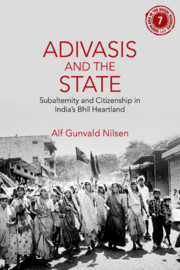Book contents
- Frontmatter
- Dedication
- Contents
- List of Maps, Figures, and Tables
- Glossary of Hindi Terms
- Preface
- 1 Introduction
- Part I Subalternity
- 2 ‘So Much Fear Was Inside Us’: Everyday Tyranny in the Bhil Heartland
- 3 ‘Quiet and Obedient Cultivators’: Colonial State Space and the Origins of Everyday Tyranny
- 4 ‘You Are Now the Masters of the Country’: Negotiations and Consolidations
- Part II Citizenship
- Bibliography
- Index
3 - ‘Quiet and Obedient Cultivators’: Colonial State Space and the Origins of Everyday Tyranny
from Part I - Subalternity
Published online by Cambridge University Press: 01 November 2018
- Frontmatter
- Dedication
- Contents
- List of Maps, Figures, and Tables
- Glossary of Hindi Terms
- Preface
- 1 Introduction
- Part I Subalternity
- 2 ‘So Much Fear Was Inside Us’: Everyday Tyranny in the Bhil Heartland
- 3 ‘Quiet and Obedient Cultivators’: Colonial State Space and the Origins of Everyday Tyranny
- 4 ‘You Are Now the Masters of the Country’: Negotiations and Consolidations
- Part II Citizenship
- Bibliography
- Index
Summary
The Bheel now feels a relish for that industry which renders subsistence secure, and life peaceful and comfortable: he unites with the Ryut [peasant] in the cultivation of those fields which he once ravaged and laid waste, and protects the village, the traveller, and the property of Government, which were formerly the objects of his spoliation; the extensive wilds, which heretofore afforded him cover during his bloody expeditions, are now smiling with fruitful crops; and population, industry, and opulence are progressing throughout the land. (Graham 1856: 222)
This is how D. C. Graham, a colonial officer writing not long before the outbreak of the Great Uprising in 1857, described the impact of a quarter-century of colonial rule on the Bhils of Khandesh—a region in today's north-western Maharashtra, where the first sustained encounters between the British and the Bhils took place. The former Bhil Agent's writings—contained in A Brief Historical Sketch of the Bheel Tribes, Inhabiting the Province of Khandesh—are expressive of two central and entwined objectives of colonial state-making in the region, namely the promotion of settled agriculture and the pacification of the ‘hitherto untameable Bhil banditti’ (ibid: 223). These objectives were pursued not just in Khandesh, which fell under direct British rule, but also in the princely states that made up large parts of the Bhil heartland after the end of the Anglo-Maratha wars in 1818. It is the central contention of this chapter that this project of colonial state-making spawned the power relations that constitute the kernel of contemporary Bhil subalternity.
In order to understand why and how the project of colonial state-making was so significant in terms of bringing about the political subordination which is manifest today in the form of everyday tyranny, it is necessary to take into account how this project pivoted on a significant restructuring of the relations of authority and sovereignty that existed between Bhil forest polities and the states of Rajput and Maratha rulers in the precolonial era. These were tributary states—that is, states undergirded by tributary modes of production. As John Haldon (1993) has argued, tributary states were based on a political economy of appropriation that was constituted of a latticework of relations between fief-holders and landowners who made up a ruling class that often constituted a political counterweight to the monarchical ruler.
- Type
- Chapter
- Information
- Adivasis and the StateSubalternity and Citizenship in India's Bhil Heartland, pp. 59 - 90Publisher: Cambridge University PressPrint publication year: 2018



